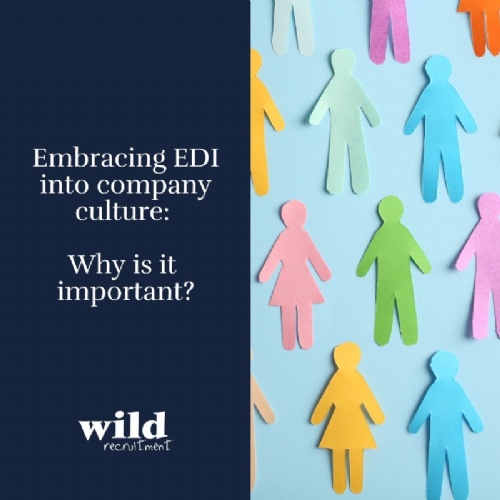EDI in company culture: Why is it important?

Encouraging inclusivity in the workplace has become a more frequent topic of discussion, as organisations recognise the profound benefits of a diverse and inclusive work environment. By cultivating an environment where all employees feel valued and respected, companies can tap into a wider range of perspectives and talents when hiring.
One of the critical areas for inclusivity is in the recruitment process. Ensuring that hiring practices are equitable and attract a diverse pool of candidates is a primary step in building an inclusive workplace.
As recruitment specialists, Wild Recruitment is uniquely positioned to help businesses in cultivating a culture of equity, diversity and inclusivity from the ground up.
Why is EDI important?
Actions speak louder than words, and implementing transparent initiatives and programs within the company are a good starting point towards EDI as a culture. Some of the key reasons EDI is essential in company culture include:
- Improved performance and innovation
Teams that are diverse in thought and experience tend to be more creative and solve problems more effectively - Better employee engagement and retention
Inclusive workplaces foster a sense of belonging, which leads to higher satisfaction and lower turnover - Wider talent pools
Embracing equity and accessibility ensure recruitment processes are open to a broader range of candidates, including those with disabilities or from underrepresented groups - Enhanced brand reputation
Companies known for inclusive practices are more attractive to clients, candidates, and employees who value fairness and representation
What can we do to encourage EDI for those with a disability at Wild?
As a company, we are always learning and adapting our processes to reach a wider group of candidates, while ensuring EDI practices are maintained. With this in mind, we reached out to Evenbreak CEO, Jane Hatton, for her perspective on how we can develop our recruitment practices for candidates with a disability.
Evenbreak is a UK based job board, founded in 2011 by Jane Hatton, exclusively for disabled candidates and inclusive employers.
‘Do your consultants feel confident around diversity and inclusion?’ asks Jane Hatton, CEO of Evenbreak and recent speaker at the 2024 Recruitment Agency Expo in London. In her talk titled ‘Attract the diversity of candidates your clients want’, Hatton discusses the ways in which recruiters and consultants can feel confident about encouraging diversity and inclusion, specifically regarding those with a disability.
What advice would you give our recruitment consultants in supporting candidates with a disability to find work?
“Recruitment consultants are often nervous about having conversations with disabled candidates. There are three pieces of advice I would give:
- Have a positive conversation with the candidate about their strengths. What skills, talents, qualities and experience do they bring with them, what do they have to offer an employer?
- Then, ask what barriers they might face in the recruitment process, and discuss what you or the client can do to remove these barriers, or find alternatives
- Consider signposting them to the Evenbreak Career Hive for free accessible career support delivered by career professionals with lived experience of disability, to help them with any application they are making”
What would you suggest to our recruitment consultants to encourage our clients to hire inclusively?
“Some employers perceive disabled candidates as a potentially expensive risk. It’s important for recruitment consultants to reassure employers that:
- Disabled candidates navigate around disabling barriers every day, meaning they develop valuable skills like problem-solving, resilience, creative thinking, communication skills – which they bring with them to the workplace
- Research demonstrates that, on average, disabled employees are every bit as productive as their non-disabled colleagues, take less time off sick, and stay in their jobs longer
- Employing disabled people gives valuable internal intelligence when working with disabled clients, customers, suppliers and partners
- Employees with neurodivergent conditions, such as autism, dyslexia and ADHD can challenge the status quo and introduce innovation
- Focus on the strengths the candidate brings with them”
What advice would you offer us as an employer ourselves in being and being seen to be an inclusive employer?
“There are many things you can to do be, and be seen to be, inclusive, including:
- Signing up to the Government’s Disability Confident Scheme
- Becoming a RIDI Pioneer
- Employ more disabled people internally, so disabled candidates can see your authenticity (find them by advertising on Evenbreak!)”
Ensuring inclusivity means providing equal opportunities for all candidates, regardless of their personal identity, sexual orientation, cultural needs or disability. Everyone should have a fair chance to compete for job roles based on their qualifications and skills rather than being excluded due to disability.
By prioritising EDI, we not only create a more supportive and dynamic workplace but also drive innovation and business success.
At Wild, we have initiatives in place that can be utilised by the team to ensure a culture embracing EDI is supported. Initiatives, such as employee coaching focused on self-development, mental habits and confidence-building, and our consultant training programme, which educates our team on eliminating bias and the importance of EDI.
Learn more about Wild's EDI practices here.

